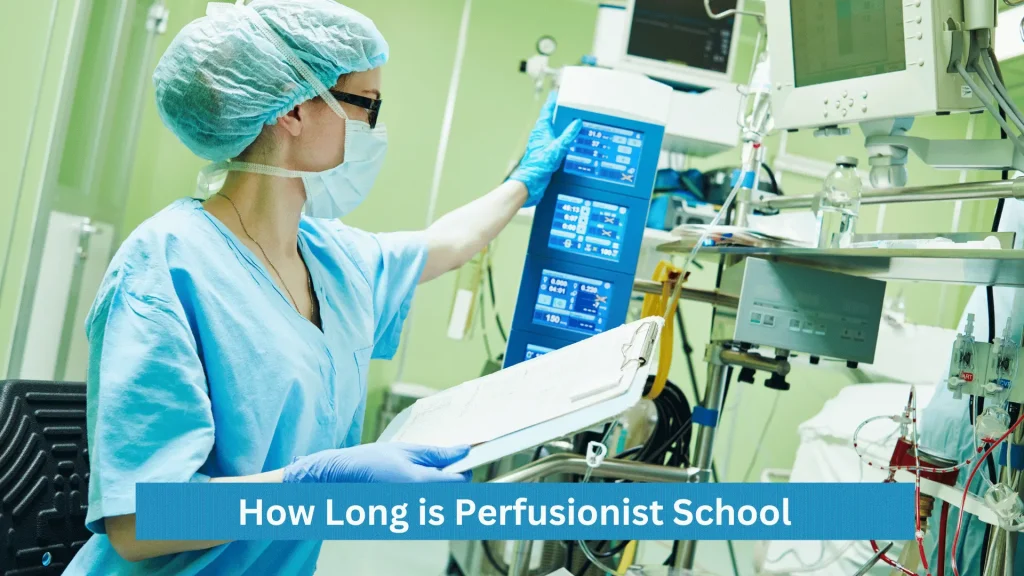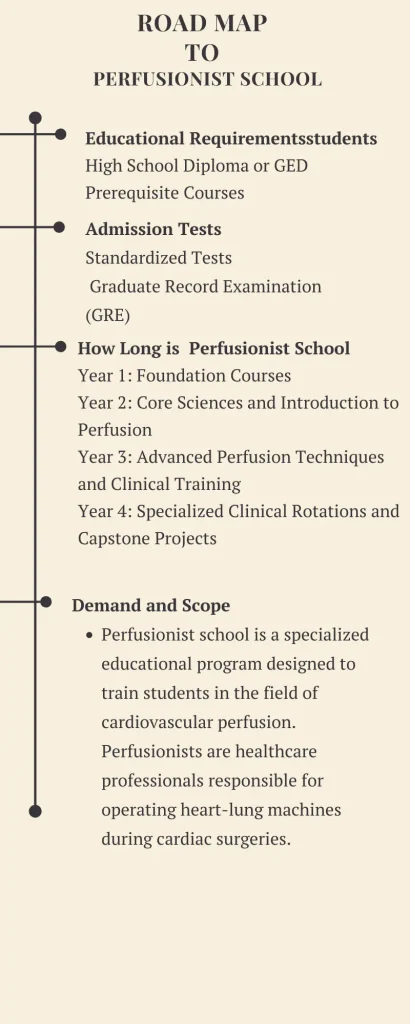How Long is Perfusionist School
How Long is Perfusionist School? Perfusionist school typically takes about two to four years to complete. The duration varies depending on the program and whether you pursue a bachelor’s or master’s degree. Clinical training is also a crucial part of the curriculum. Understanding how long is perfusionist school can help you plan your career path effectively.
What is Perfusionist School
Perfusionist school is a specialized educational program designed to train students in the field of cardiovascular perfusion. Perfusionists are healthcare professionals responsible for operating heart-lung machines during cardiac surgeries. The curriculum includes courses in anatomy, physiology, pharmacology, and hands-on clinical training to prepare students for real-world scenarios.

In addition to theoretical knowledge, perfusionist school provides extensive practical experience. Students learn to manage extracorporeal circulation and ensure the patient’s blood flow and oxygenation during surgery. This rigorous training is essential for developing the skills and expertise required to become a competent perfusionist in the healthcare industry.
How Long is Perfusionist School
Year 1: Foundation Courses
In the first year, students focus on foundational courses such as biology, chemistry, and human anatomy. These subjects provide a solid base in the sciences, essential for understanding advanced concepts in perfusion technology. Basic medical terminology and introductory courses in healthcare may also be included.
Year 2: Core Sciences and Introduction to Perfusion
The second year typically involves more specialized courses in physiology, pharmacology, and medical ethics. Students begin introductory perfusion courses, learning about the basics of extracorporeal circulation and the equipment used in perfusion. Laboratory sessions and simulations may be part of the curriculum to provide hands-on experience.
Year 3: Advanced Perfusion Techniques and Clinical Training
In the third year, the focus shifts to advanced perfusion techniques. Students learn about the various types of perfusion equipment and their applications in different surgical procedures. Clinical training becomes a significant component, with students spending time in hospitals or clinical settings under the supervision of experienced perfusionists.
Year 4: Specialized Clinical Rotations and Capstone Projects
The final year is primarily dedicated to specialized clinical rotations. Students gain in-depth experience in different aspects of perfusion, such as pediatric and adult cardiac surgeries, and other specialized procedures. Capstone projects or research assignments may be required to demonstrate their understanding and competence in the field. This year ensures that students are well-prepared for certification exams and entry into the professional world as perfusionists.

How to Enter Perfusionist School
Educational Requirements for Perfusionist School
High School Diploma: Completion of high school with a focus on science courses such as biology, chemistry, and physics.
Prerequisite College Courses: Some programs require completion of college-level courses in anatomy, physiology, and microbiology.
Bachelor’s Degree: Many perfusionist programs require applicants to have a bachelor’s degree, often in a science-related field.
Entry Tests for Perfusionist School
Standardized Tests: Some programs may require scores from standardized tests like the SAT or ACT.
Graduate Record Examination (GRE): For programs that offer a master’s degree, the GRE may be required.
Application Process for Perfusionist School
Research Programs: Identify schools offering accredited perfusionist programs and review their specific requirements.
Prepare Transcripts: Collect and submit official transcripts from all educational institutions attended.
Letters of Recommendation: Obtain letters of recommendation from academic or professional references.
Personal Statement: Write a personal statement detailing your interest in the field of perfusion and your career goals.
Application Forms: Complete and submit the application forms specific to each program.
Interviews: Some programs may require an interview as part of the admission process.
Financial Aids for Perfusionist School
Scholarships: Look for scholarships specifically for healthcare or perfusionist students, offered by schools, professional organizations, or private foundations.
Grants: Apply for federal and state grants that do not require repayment, such as the Pell Grant.
Student Loans: Federal student loans, such as Direct Subsidized and Unsubsidized Loans, can help cover tuition costs.
Work-Study Programs: Participate in work-study programs that provide part-time jobs to help pay for educational expenses.
Institutional Aid: Check with the schools for institutional aid options, including merit-based and need-based financial aid packages.
Post Graduate and PhD Programs
Post Graduate Programs for Perfusionists
1. Master’s Degree in Cardiovascular Perfusion:
- Duration: Typically 2 years.
- Curriculum: Includes advanced coursework in cardiovascular physiology, pharmacology, medical ethics, and clinical perfusion techniques.
- Clinical Training: Extensive hands-on clinical rotations in hospitals and surgical centers.
- Thesis/Research: Often requires a research project or thesis related to perfusion science.
2. Master’s in Health Administration (MHA) with a focus on Perfusion:
- Duration: 2-3 years.
- Curriculum: Combines healthcare management and leadership training with specialized courses in perfusion.
- Career Path: Prepares graduates for administrative and leadership roles within healthcare organizations, focusing on perfusion services.
3. Master’s in Biomedical Engineering with a specialization in Perfusion Technology:
- Duration: 2-3 years.
- Curriculum: Emphasizes the design and development of perfusion devices and technologies.
- Research Opportunities: Includes extensive research components, often in collaboration with medical device companies.
PhD Programs for Perfusionists
1. PhD in Cardiovascular Science with a specialization in Perfusion:
- Duration: 4-6 years.
- Curriculum: Advanced study of cardiovascular physiology, pathophysiology, and the role of perfusion in cardiac surgeries.
- Research Focus: In-depth research projects, often leading to innovations in perfusion techniques and equipment.
2. PhD in Biomedical Engineering with a focus on Perfusion Technology:
- Duration: 4-6 years.
- Curriculum: Advanced engineering principles applied to the development of perfusion devices and technologies.
- Research and Development: Extensive research in creating and improving perfusion systems, with potential collaborations with medical device manufacturers.
3. PhD in Clinical and Translational Science with a focus on Perfusion:
- Duration: 4-6 years.
- Curriculum: Focuses on translating research findings into clinical practice, particularly in perfusion science.
- Clinical Research: Involves clinical trials and studies aimed at improving patient outcomes in surgeries requiring perfusion.
Top 10 Perfusionist Schools
Creating a list of the “Top 10 Perfusionist Schools” involves considering factors like program reputation, accreditation, faculty expertise, clinical opportunities, and student outcomes. Here’s a hypothetical list based on these criteria:

University of Texas Health Science Center at Houston (UTHealth)
Program: Master of Science in Cardiovascular Perfusion
Highlights: Offers extensive clinical training, strong emphasis on research, and partnerships with leading hospitals.
Medical University of South Carolina (MUSC)
Program: Master of Science in Cardiovascular Perfusion
Highlights: Known for its comprehensive clinical rotations and state-of-the-art facilities.
Midwestern University, Glendale Campus
Program: Master of Science in Cardiovascular Science
Highlights: Provides a robust curriculum combining clinical practice with advanced cardiovascular science courses.
University of Iowa
Program: Master of Science in Cardiovascular Perfusion
Highlights: Offers a strong focus on both clinical and academic excellence, with opportunities for research and hands-on training.
Vanderbilt University Medical Center
Program: Certificate in Cardiovascular Perfusion
Highlights: Highly respected program with a strong emphasis on clinical experience and mentorship from experienced professionals.
Cleveland Clinic
Program: Certificate in Cardiovascular Perfusion
Highlights: Provides exceptional clinical training at one of the top medical centers in the country.
Rush University
Program: Master of Science in Perfusion Technology
Highlights: Emphasizes a multidisciplinary approach, combining perfusion technology with other healthcare disciplines.
University of Nebraska Medical Center (UNMC)
Program: Master of Perfusion Science
Highlights: Known for its rigorous curriculum and extensive clinical training opportunities.
SUNY Upstate Medical University
Program: Master of Science in Cardiovascular Perfusion
Highlights: Offers a comprehensive program with a strong focus on clinical practice and research.
University of Pittsburgh
Program: Master of Science in Cardiovascular Perfusion
Highlights: Provides a well-rounded education with a balance of classroom instruction, clinical training, and research opportunities.
Factors Affecting the Length of Perfusionist School
Several factors influence the duration of perfusionist school:
Degree Level: Programs offering a bachelor’s degree typically take around four years to complete, while master’s programs may take an additional one to two years.
Curriculum Structure: The organization of coursework and clinical training varies among programs, affecting overall duration.
Clinical Training Requirements: Programs with extensive clinical rotations or internships may require more time to complete.
Prerequisite Requirements: Additional coursework or prerequisites needed before entry can extend the length of the program.
Program Format: Full-time versus part-time enrollment options can impact how quickly a student completes the program.
Certification Requirements: Some programs include preparation for certification exams, which may add time to the educational process.
Individual Progress: Student ability to complete coursework and clinical requirements within the expected timeframe also influences program length.
Understanding these factors helps prospective students plan their educational path and expectations for becoming a perfusionist.
Final Verdict
Choosing to pursue a career in perfusionist school involves understanding the educational commitment required. Factors such as program duration, clinical training, and degree levels vary, influencing the overall journey to becoming a qualified perfusionist.
FAQs
What is a perfusionist?
A healthcare professional who operates heart-lung machines during surgeries.
How long does perfusionist school take?
Typically, four years for a bachelor’s degree or longer for master’s programs.
What are the educational requirements for perfusionist school?
High school diploma, prerequisite courses, and often a bachelor’s degree in a related field.
Are financial aids available for perfusionist school?
Yes, scholarships, grants, loans, and work-study programs can help finance education.
What are the career prospects for perfusionists?
High, with opportunities in hospitals, clinics, and research institutions.
